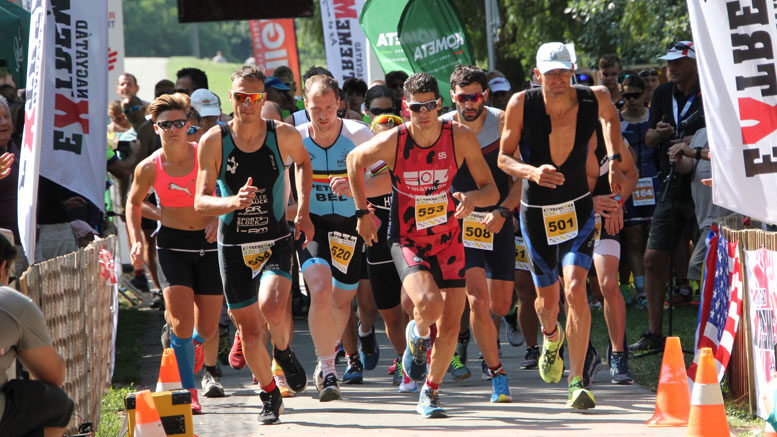A few days after the race in Kaposvar, it is time to look back and take stock. It should have been a great competition weekend in Hungary, with the Sprint World Cup on Saturday and the long-distance World Cup on Sunday. But on Friday, as the first athletes arrived at the lake, they had a great shock – Lake Deseda had transformed due to the long heat wave in Hungary. Numerous algal blooms had formed and spread throughout the lake and a foul smelly scum had formed on the shore. It quickly became clear to those officers of the WQF that were present that one couldn’t get into the water here. Neither could paddling take place under these conditions, where skin contact with the contaminated water was inevitable.
However, the organizers did not want to make this decision until the morning of the competition and were still hoping for rain during the night – which, had it happened, would certainly not have had any significant effect. The organizers also based their hopes on a water sample taken some days earlier, with the questionable assumption that this was probably still valid. On Friday, however, there was no doubt, visually and by smell, so the WQF quickly made the decision to protect all athletes that there should not be a quadrathlon. As an alternative, the organizers could then organize the event as a duathlon, so that at least something could take place.
This was a very unsatisfactory situation, especially as many athletes had made a long journey and, if there was to be no quadrathlon, there would be no World Cup points for a duathlon. Even though the organizers cannot do anything about the quality of the lake, the water is a critical component of the event. The worries over water quality were known for a long time and should have been communicated to the athletes in advance, with an explanation of what would happen if both swimming and kayaking were cancelled. Waiting for this decision until the morning of the competition is unfortunately not in the interests of the athletes. The WQF was at least able to inform a few athletes about the revised status on Friday.
A duathlon was held on Saturday -2.5km run – 20km bike – 5km run and on Sunday – 5.3km run – 90km bike – 21km run. This also affected the triathletes, who were also numerous at Deseda Lake, and were started almost at the same time as the quadrathletes. Unfortunately, further difficulties were to develop, especially when cycling. Hungarian rules for sprint races in duathlon / triathlon allow drafting when cycling and the use of time trial bikes – many other associations do not consider this to be a safe practice. Drafting was forbidden on Sunday, but unfortunately due to a short-term construction site, the diversion around the construction site was suddenly on the bike route. Some stewards and policemen tried their best but could not prevent dangerous situations from arising. Furthermore, there was of course the extreme heat, especially on Sunday, which didn’t make it any easier for the athletes – but at least this was known in advance and one could be prepared for it.
The athletes dealt with this situation differently, sometimes, if possible, they didn’t even travel or rescheduled and used the duathlon as training for the next sprint races. But that didn’t detract from Borja Estomba’s performance. The Spaniard was able to secure victory on both days and this without his special discipline, paddling, and despite a collision with a car on the bike course on Sunday. In the women’s category, Fanni Bodolai-Kiss (HUN) was strong after her baby break and won the sprint. On Sunday on the longer route, Susanne Walter (GER) was the fastest.
It was really an extreme – this time, unfortunately, extremely negative – weekend at ExtremeMan in Kaposvar and even if it has been a superbly well-organized event in recent years, the organizers have not had luck on their side this year. But one message is also clear, climate change is making its presence felt in our sport and such water conditions may occur more frequently. This will not make the WQF’s search for good organizers and the corresponding conditions in this small sport any easier.
translated by John Kavanagh
[Not a valid template]
by L. Rohde
Results
Sprint
| 1. Borja Estomba (ESP) | 1:00:16 |
| 2. Wiliam Peters (BEL) | 1:01:12 |
| 3. Ferenc Csima (HUN) | 1:02:37 |
| 4. Stefan Teichert (GER) | 1:04:41 |
| 5. Ábel Szabó (HUN) | 1:04:48 |
Women
| 1. Fanni Kiss-Bodolai (HUN) | 1:09:42 |
| 2. Lisa Teichert (GER) | 1:14:01 |
| 3. Panna Pálos (HUN) | 1:20:11 |
| 4. Kata Balázs (HUN) | 1:20:31 |
| 5. Bernadett Cseke-Nagy (HUN) | 1:26:33 |
| 1. Borja Estomba (ESP) | 4:29:51 |
| 2. Ferenc Csima (HUN) | 4:37:23 |
| 3. David Kotrc (CZE) | 4:55:50 |
| 4. Romek Pietrzak (POL) | 5:27:28 |
| 5. Michael Matthias (SUI) | 5:33:54 |
Women
| 1. Susanne Walter (GER) | 5:45:44 |
| 2. Csilla Ódor-Sápi (HUN) | 6:32:48 |
Organizer Homepage
Older contributions
- Again the usual good conditions at Deseda Quadrathlon – 07.08.2022
- Extreme weekend in Kaposvar – 01.08.2021
- A bit of normality- the first quadrathlon takes place in Kapsovar – 29.06.2020
- Superb Sprint World Championship in Hungary – 25.07.2019
- Great performance of young competitors at Deseda Quadrathlon – 25.06.2018
- Perfect conditions at Deseda Quadrathlon – 03.07.2017





